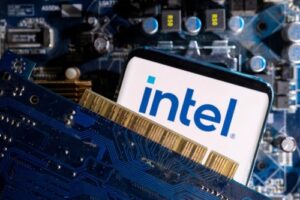(Reuters) – Shares of Nvidia rose on Thursday after the chipmaker forecast an upbeat second-quarter revenue and announced a stock split that floored investors and once again showcased its dominance in the AI-related chips market.
The company’s stock rose 6.5% in premarket trading, with rival AI-related chipmakers Advanced Micro Devices, Broadcom and Micron Technology also gaining between 2% and 3%.
The poster child of AI chips forecast fiscal second-quarter revenue of $28 billion, plus or minus 2%, with analysts on average expecting revenue of $26.66 billion, according to LSEG data.
Wall Street’s third most valuable firm, Nvidia has surged almost 92% this year and is set to gain about $165 billion in market cap at current price levels of $1,016.
If it closes above $1,000 on Thursday, it would mark the first time Nvidia’s stock has climbed above that psychologically important threshold.
“The stock price will certainly reach $1,000 per share, but whether it can maintain that level is uncertain,” said Ipek Ozkardeskaya, senior analyst at Swissquote Bank.
Nvidia also said it would split its stock ten-for-one, effective June 7, and raised its quarterly dividend by 150% on a post-split basis.
The Santa Clara, California-based company’s chips are the gold standard in artificial intelligence and its results are widely seen as a barometer for the burgeoning AI industry, whose evolution has stoked investor enthusiasm and helped drive the bull run in U.S. stocks.
“You can’t help feeling Nvidia left a lot of gas in their tank to beat and raise from here,” Melius Research analyst Ben Reitzes wrote in a note, citing revenue from its Blackwell chip products and demand for other new chips.
Nvidia continued to flag demand was exceeding supply but CEO Jensen Huang said their upcoming Blackwell AI chips will ship in the current quarter, with production increasing in the following quarter.
“Given Nvidia’s astronomical growth, we continue to assess the risk of companies buying too many AI GPUs too soon, leading to an air pocket and excess inventory at some point in the future. We see no such signs today,” Morningstar analysts wrote in a note.
Brokerages Bernstein and Jefferies also said fears of an “air pocket” in the near term should likely mellow.
At least 10 brokerages raised their price targets (PTs) on the stock – Rosenblatt Securities and Cantor Fitzgerald have the highest PT of $1,400 among 58 analysts covering the firm, according to LSEG data.
Taiwan Semiconductor Manufacturing, Nvidia’s contract chipmaker, said in April it expects to more than double its advanced packaging capacity this year.
Nvidia has a 12-month forward price-to-earnings ratio of 34.7, compared with AMD’s 38 and Super Micro Computer’s 26.8 and Micron’s 20.2.
(Reporting by Gokul Pisharody and Siddarth S in Bengaluru and Danilo Masoni in Milan; Editing by Amanda Cooper and Krishna Chandra Eluri)



